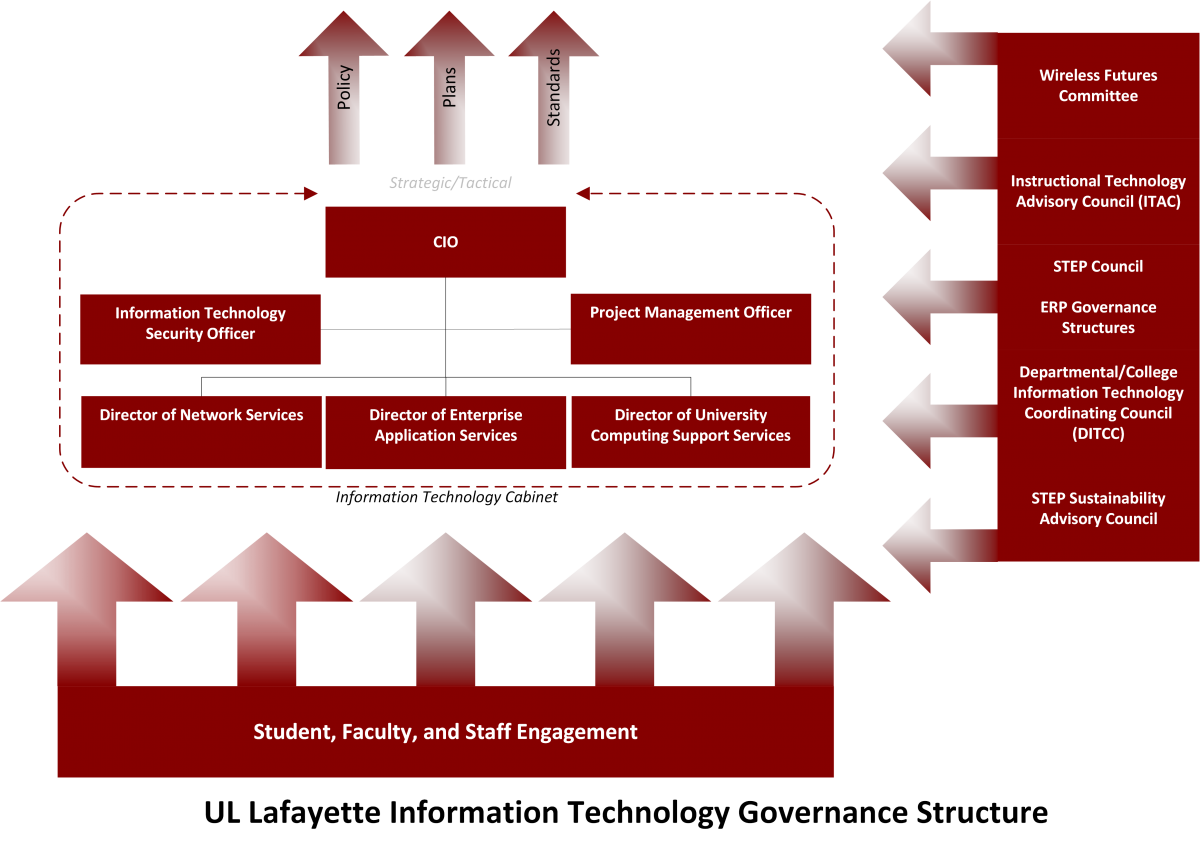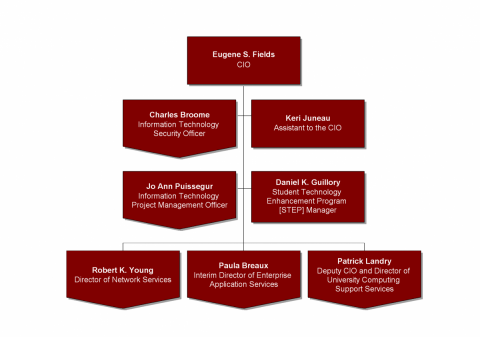Information Technology Governance
University of Louisiana at Lafayette Information Technology governance consists of well defined, formalized, and transparent processes receiving input from stakeholders and producing strategic/tactical plans, policies, and standards that effectively manage scarce University resources. These processes guide informed, collaborative and strategic decision-making by University leadership. The governance organization and related processes provide a decision making authority that is accountable and transparent.
The Governance structure includes the following components:
Departmental/College Information Technology Coordinating Council (DITCC) - Unit IT staff organized to address local issues and provide representation for the University departments and colleges;
Instructional Technology Advisory Council (ITAC) - The Instructional Technology Advisory Council (ITAC) is comprised of representatives from various Colleges, Departments and Organizations throughout the University who are involved in technology-mediated teaching and learning. The Council meets monthly to discuss instructional technology initiatives, best practices for using teaching tools, and emerging pedagogical trends in higher education. This group will advise the Provost and CIO on defining and managing classroom and laboratory technology standards, prioritizing instructional technology projects/initiatives, and recommending/developing new pedagogies that fully utilize technology to enhance the educational experience and increase learning outcomes of our students.
STEP Council - The STEP Council was established by the Student Government Association on behalf of the Student Body of the University of Louisiana at Lafayette to ensure the University remains at that forefront of technology for future generations of students. The initial Charter defined the following roles:
- All powers of approval of funds of the Student Technology Enhancement Program shall be vested in the Student Technology Enhancement Program Council.
- The Student Technology Enhancement Program Council shall be composed of the University Chief Information Officer, SGA Vice President, all SGA College Presidents, the University Provost or his/her designee, the University Vice President of Student Affairs or his/her designee, and the Director of Disability Services or his/her designee. In the absence of a college president, that president may send a senator from his/her college for that college’s representation.
- The term of the members of the Student Technology Enhancement Program Council shall be one (1) year concurrent with the term of the SGA President.
- The Student Technology Enhancement Program Council shall have the power to fund, reject, and/or amend any proposal submitted for review by the Student Technology Enhancement Program.
- The Student Technology Enhancement Program Council shall be responsible for creating and overseeing the proposal process.
- The Student Technology Enhancement Program Council shall maintain by-laws.
- The Student Technology Enhancement Program Council shall identify STEP initiatives and update them at least annually.
- The Student Technology Enhancement Program Council shall give funding priority to proposals that are in accord with STEP initiatives.
- The Student Technology Enhancement Program Council shall correspond on all matters with the submitters of proposals.
- The Student Technology Enhancement Program Council shall adhere to the proposal process.
- Proposals shall first be reviewed by the Student Technology Enhancement Program Council.
STEP Sustainability Advisory Council - The STEP Sustainability Plan provides for a committee of faculty, students and staff to oversee and set priorities for lab maintenance, management and software licensing. This team will be appointed by the CIO and serve a two-year membership on the committee. To assure accountability and transparency the committee created above will produce an annual report that 1) documents the initiatives and priorities of committee; 2) provides laboratory utilization data; and 3) summarizes STEP Sustainability expenditures by category. In addition, the committee will begin to work to supplement student opinion surveys with questions regarding laboratory satisfaction.
Wireless Futures Committee - The Wireless Futures Committee is a team of students, faculty and staff that will guide the strategic enhancements of the institutional wireless expansion;
Information Technology Cabinet (Directors of three major IT divisions, Security Officer, and Project Management Officer): University Computing Support Services, Network Services, Enterprise Application Services, IT Project Manager, and IT Security Officer) that approves university-wide policies and standards, strategic university-wide projects and associated budget, which requires a University financial commitment.
Enterprise Resource Planning System Governance (ERP)
Executive Governance - The University Council functions as the ERP Executive Steering Committee. This team meets two to three times per month and is chaired by the Provost. The committee is the executive group that will provide overall direction, leadership and executive sponsorship for the project, approve changes to scope, timeline or budget, resolve major policy or business practice issues (as needed), and monitor project progress and assure that risks and issues are resolved. Members of the University Council will also support project communication and institutional culture change as well as promote buy-in on the part of the university community.
Change Control Board - The Change Control Board (CCB) approves escalated requests for upgrades and point releases for the ERP System after review and recommendation by the Change Control Board Technical Review Subcommittee. The Board also review, approves or escalates issues from the subject matter expert team leads as well as the data standards subcommittee.
Data Standards Subcommittee - The Data Standards Subcommittee meets on an ad-hoc basis to assess requested changes to the University Data Standards Documents and to make recommendations to the subject matter expert team leads and ultimately to the Change Control Board. The Change Control Board will render a decision to amend or not amend the Data Standards Document.
Subject Matter Expert Teams - One attribute shared by successful ERP projects can best be described by the phrase "organizing the enterprise for success"! The University has created and appointed expert teams to manage the implementation and operational aspects of the new system. These "expert" team members are faculty and staff that currently work in the various service areas in and around campus.


